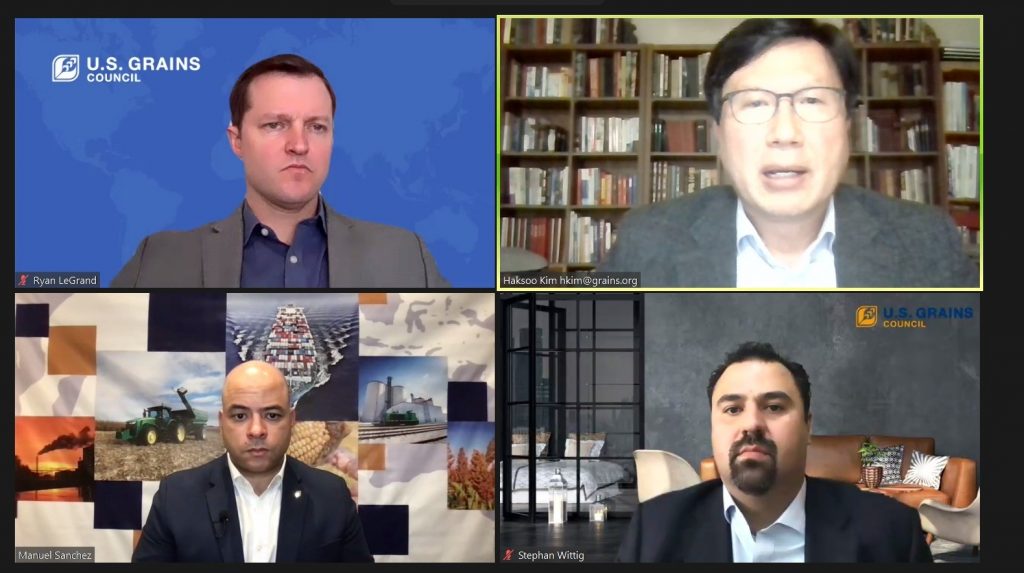From gathering intelligence from high-level futurists and trade flow specialists to hearing from key staff in in-country in overseas markets, the U.S. Grains Council’s (USGC’s) farmer and agribusiness members looked to the future during the organization’s winter conference, held virtually this week.
The Council’s 18th International Marketing Conference and 61st Annual Membership Meeting is the 2021 version of the annual sessions bringing members together with the Council’s global staff to plan marketing strategies for U.S. grain exports. The sessions were held online to accommodate COVID-19-related restrictions – and to allow more interaction from all types of participants.
The meeting boasted 368 registrants and focused on the trade landscape and future of trade post-pandemic. It wrapped up Wednesday, clocking in more than nine hours’ worth of Advisory Team (A-Team) meetings spread over three days, during which USGC members set the course for the Council’s coming trade strategy.
On Monday, the meeting kicked off with a general session featuring two speakers who are experts in global agricultural trends, consumer attitudes and export strategies – Jack Bobo, CEO of Futurity, a food foresight company, and Shawn Marie Jarosz, founder and chief strategist at TradeMoves, a consultancy focused on eliminating barriers to trade.
Bobo advised attendees to think about the future instead of being focused on the present, so that as situations like COVID-19 progress, they will be ready to respond with considered trade solutions. Jarosz counseled that the United States must surpass tariff and non-tariff hurdles to reset the trade landscape.
The kickoff speakers were followed by a panel of the Council’s international directors including Stephan Wittig, USGC director in Mexico, Haksoo Kim, USGC director in South Korea, and Manuel Sanchez, USGC regional director in Southeast Asia, who spoke with Council President and CEO Ryan LeGrand about how they continue to reach out to grains, co-product and ethanol customers around the world during the pandemic.
“The pandemic forced us all to shift our thinking and engage differently in our markets around the world,” LeGrand said. “It’s vital to consider where the markets are headed, especially given what we are learning about how the coronavirus is impacting the markets around the world.”
While the pandemic offered each market different challenges, the directors all agreed that moving to virtual platforms also had some positive side effects.
Kim, Wittig and Sanchez acknowledged they’ve each seen customer engagement increase as a result of COVID-19, although through a new way – holding virtual meetings that allow attendance by higher-level stakeholders who wouldn’t have otherwise had the time do so so in person.
On Wednesday, attendees participated in the Council’s Board of Delegates meeting during which A-Teams leaders reported out groups’ their recommendations along, sector leaders gave reports from their conversations, and longtime Council producer members and staff were recognized for their years of service.
The Council took time to recognize Missouri Corn Growers Association and Missouri Corn Merchandizing Council’s retiring CEO Gary Marshall for his decades-long involvement with the Council.
In addition, staff posthumously honored Floyd Gaibler, Council director of trade policy and biotechnology, for his contributions to the Council’s ongoing work.
“Floyd’s passing is a huge loss for his own family, of course, but also for his Council family, for which there was not a corner of the world that his legacy doesn’t touch,” LeGrand said.
“Floyd was not only a leader at the Council, but he spent many years prior to the Council at the USDA, and his trade policy footprints within our wide net of cooperator organizations will be forever part of the trade and agricultural landscape that we all value so much.”
Check the Council’s social media for more about the meeting.
About The U.S. Grains Council
The U.S. Grains Council develops export markets for U.S. barley, corn, sorghum and related products including distiller’s dried grains with solubles (DDGS) and ethanol. With full-time presence in 28 locations, the Council operates programs in more than 50 countries and the European Union. The Council believes exports are vital to global economic development and to U.S. agriculture’s profitability. Detailed information about the Council and its programs is online at www.grains.org.

